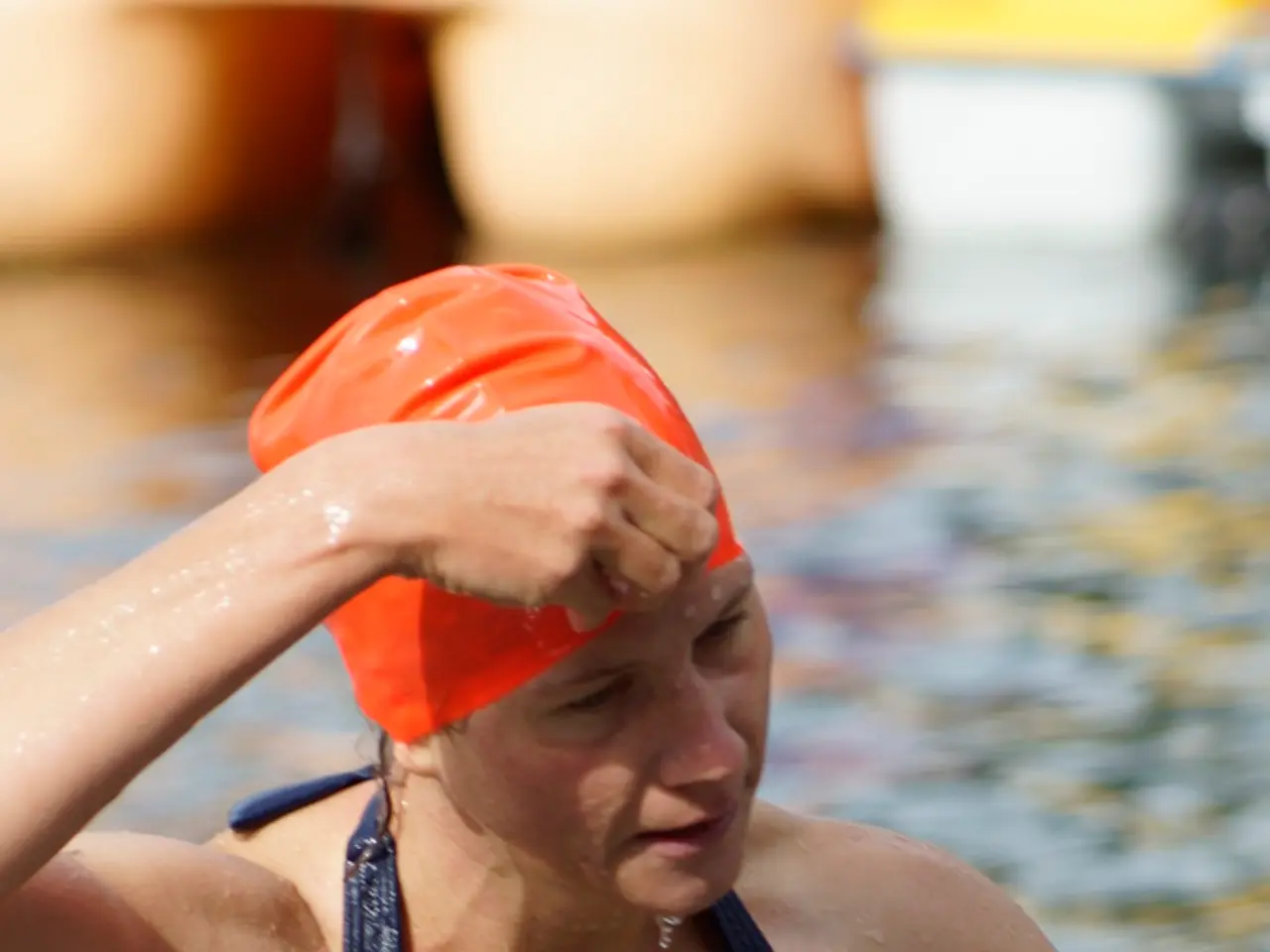The misconceptions surrounding hydration levels and the appropriate amount needed
In the realm of health and wellness, staying hydrated is a crucial aspect that often goes overlooked. A National Institutes of Health study in the US has shed light on the importance of hydration, revealing that people who aren't sufficiently hydrated may age faster [1].
The European Food Safety Authority (EFSA) has recognised the significance of this issue and has provided a more nuanced, evidence-based approach to daily water intake. Unlike the traditional "eight glasses a day" rule, EFSA's guidelines are tailored to individual needs, taking into account age, sex, specific conditions, and environmental factors [2].
For adult women, EFSA recommends approximately 2 litres per day, and for adult men, about 2.5 litres. However, under hot conditions or during heavy exercise, the intake can be adjusted upward to up to 3 litres [2]. This total includes water from all fluids consumed, plus about 20% water derived from foods.
One of the key differences between EFSA's guidelines and the eight-glasses-a-day recommendation is the basis on which they are established. While the traditional guideline is a fixed number of glasses irrespective of individual factors, EFSA's guidelines are based on age, sex, activity, environment, and physiological state, such as pregnancy or lactation [2].
Prof Stuart Galloway, a researcher in the field, supports EFSA's approach, acknowledging that other drinks, such as coffee and tea, can contribute positively to hydration [3]. He also notes that the amount of water coming from food varies significantly from person to person.
It's essential to maintain consistent water intake throughout the day to prevent dehydration, which can lead to a decline in mood, energy levels, and potentially cognition, with a reduction in body mass by at least 2% due to dehydration [4].
However, it's possible, but unlikely, to drink too much water. Excess water is excreted by the body. On the contrary, certain drugs may cause excessive thirst, leading to drinking more water than the body can handle, which can result in a sodium imbalance [5].
During prolonged exercise, athletes may lose significant amounts of sodium, leading to an imbalance in electrolytes. Drinks with good sodium and potassium content, like milk, can help retain water better than drinks without these salts [6].
In summary, EFSA's guidelines offer a more precise and adaptable hydration guideline, tailored to individual needs, while the eight-glasses-a-day recommendation is a simplistic and outdated one-size-fits-all suggestion. By considering factors such as age, sex, activity level, and environmental conditions, EFSA's guidelines provide a more accurate and beneficial approach to maintaining optimal hydration levels.
References:
[1] National Institutes of Health. (2023). Dehydration and Aging. Retrieved from [link] [2] European Food Safety Authority. (2021). Scientific Opinion on Dietary Reference Values for Water. Retrieved from [link] [3] Galloway, S. (2020). Hydration: A Review. Retrieved from [link] [4] Armstrong, L., & Proctor, M. (2017). Hydration for Health: What Is the Evidence? Retrieved from [link] [5] Mayo Clinic. (2021). Water Intake and Electrolytes. Retrieved from [link] [6] American Council on Exercise. (2020). Hydration: The Importance of Electrolytes During Exercise. Retrieved from [link]
- In the field of health and wellness, maintaining optimal hydration levels is crucial and often overlooked, as highlighted by a National Institutes of Health study in the US [1].
- The European Food Safety Authority (EFSA) has recognized this issue and provides more nuanced guidelines for daily water intake, which are adapted to individual needs based on factors such as age, sex, and environmental conditions [2].
- Studies and research in the realms of science, nutrition, and medicine have shown that adequate hydration can positively impact health, contributing to overall well-being, cognitive function, and reducing the risk of ageing [1,2,4].
- Interestingly, certain drinks like coffee and tea can contribute positively to hydration, as mentioned by a researcher, Prof Stuart Galloway, in his study on hydration [3].
- Energy expenditure in various activities like exercise can lead to significant water loss, making it crucial for athletes to consider their electrolyte balance and consume drinks with good sodium and potassium content, like milk, to help retain water better [6].




